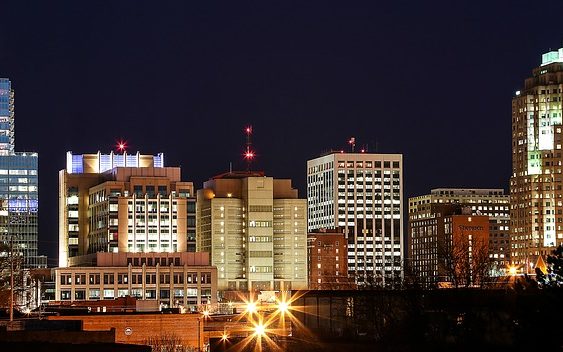- Seven months after Hurricane Helene, Chimney Rock rebuilds with resilience
- Wildfire in New Jersey Pine Barrens expected to grow before it’s contained, officials say
- Storm damage forces recovery efforts in Lancaster, Chester counties
- Evacuation orders lifted as fast-moving New Jersey wildfire burns
- Heartbreak for NC resident as wildfire reduces lifetime home to ashes
You’re not safe inland during a hurricane. Here’s why, according to storm experts.

The Carolinas’ costliest hurricanes
Hurricane Florence swept into the Carolinas in 2018 and caused extensive damage in both states. Florence set a record for the costliest storm to hit the Carolinas. Here’s a look at other costly hurricanes.
Hurricane Florence swept into the Carolinas in 2018 and caused extensive damage in both states. Florence set a record for the costliest storm to hit the Carolinas. Here’s a look at other costly hurricanes.
Some of the region’s and nation’s leading meteorologists came to Charlotte on Thursday to talk about hurricanes.
But the focus of their discussion had little to do with storm surges, 100 mph-plus winds, or even the two “hurricane-hunter” aircraft that attracted the attention of hundreds of visitors at Charlotte Douglas International Airport.
“What happens when the storm goes inland,” National Hurricane Center Director Ken Graham said. “I think we’ve done a good job of educating about the coastal impacts. But the inland impacts … that’s a big issue for us.”
The The National Oceanic and Atmospheric Administration Hurricane Awareness Tour made one of its five stops in Charlotte, and the inland impact of Hurricane Florence last September was a big topic of discussion.
Florence was a minimal hurricane when it made landfall, but the slow-moving storm dumped nearly 36 inches of rain in southeastern North Carolina and caused major flooding as close to Charlotte as Union and Stanly counties.
It was responsible — directly and indirectly — for 40 deaths in North Carolina and more than $17 billion in damage. Large areas of Robeson, Columbus and other counties, well inland from the coast, were under water for weeks.
 Robert Simmons Jr. and his kitten, Survivor, are rescued from floodwaters in New Bern, NC, after Hurricane Florence dumped several inches of rain in the area overnight, Sept. 14, 2018. Hundreds were rescued from eastern North Carolina in the wake of the slow-moving storm. Andrew Carter acarter@newsobserver.com
Robert Simmons Jr. and his kitten, Survivor, are rescued from floodwaters in New Bern, NC, after Hurricane Florence dumped several inches of rain in the area overnight, Sept. 14, 2018. Hundreds were rescued from eastern North Carolina in the wake of the slow-moving storm. Andrew Carter acarter@newsobserver.comGraham said he believes meteorologists are making headway in educating the public about the inland dangers of tropical weather systems. The biggest of those perils is flooding because of heavy rain, but tornadoes and damaging winds also are issues.
“Many people don’t realize that 83 percent of fatalities related to tropical weather systems are due to inland flooding,” he said.
Educating the public about flooding remains a problem, said Steve Wilkinson meteorologist-in-charge at the National Weather Service office in Greer, S.C.
“We still have to beat that drum,” he said. “We still have people driving into high water — even people moving barricades and driving around them.”
Eighty percent of the deaths in Florence were people in cars, said Dave Novak, director of the Weather Prediction Center, the government office that handles warnings and advisories for flooding and other weather perils.
“Humans have a positive bias,” he said. “They believe they can drive through a flooded road.”
 Leslie Chapman Henderson, president of the Federal Alliance for Safe Homes, talks to people Thursday at the Hurricane Awareness Tour’s stop at Charlotte Douglas International Airport. Steve Lyttle The Charlotte Observer
Leslie Chapman Henderson, president of the Federal Alliance for Safe Homes, talks to people Thursday at the Hurricane Awareness Tour’s stop at Charlotte Douglas International Airport. Steve Lyttle The Charlotte ObserverNovak said meteorologists and government officials are looking at a number of preventative measures. One possibility would be for highway officials to close flood-prone roads in advance of storms.
“That’s just one idea that we’re kicking around,” he said. “We’re talking about a lot of things. This is something we need to deal with.”
Meanwhile, others are looking at the issue of building storm-safe homes.
Many people are living in areas without building codes, or with badly outdated codes, said Leslie Chapman Henderson, president of the nonprofit group Federal Alliance for Safe Homes.
“We’ve been able to complete a thorough study of the problem, so we have the data,” she said. “North Carolina is a state where there are problems, although I understand an update to the building codes is scheduled soon. There is still a lot to do.
“When you lose your home, or it’s badly damaged, you’re never whole again. You’ve suffered losses that you can’t come back from.”
Follow Steve Lyttle on Twitter: @slyttle